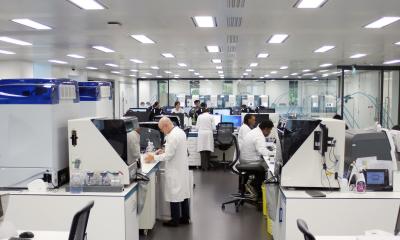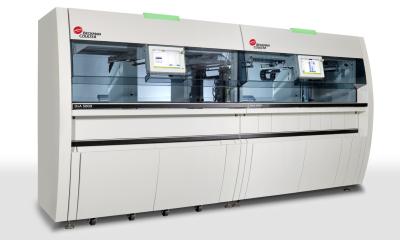In command of all critical events
Access and monitoring of multiple lab instruments from a centralised location.

With the launch of Command Central - a laboratory workstation with in-built Remisol 2000 Data Management - we asked Al Akiyama, Manager of Information Systems Product Management at Beckman Coulter Inc, whether such systems might transform the role of the lab professional into that of an IT specialist ‘Not necessarily,” said Al Akiyama. ‘We found that work in laboratories around the world is constantly increasing but no one hires more staff. While labs need new technology to help them manage more information and workflow more effectively, it also must be simple and easy to use among staff with varying degrees of expertise.. ‘ The firm designed this new system for easy, efficient use by a lab technician. ‘From one workstation test results can be monitored and managed - and so can all the lab instruments, without having to actually go to each instrument individually every hour.’
When a sample tests normal or acceptable, Remisol with Command Central, automatically releases the result to the laboratory information system (LIS), which forwards it to the hospital information system (HIS) for entry on the electronic patient record (EPR). ‘The technician does not have to do anything about those cases,’ Al Akiyama explained. ‘However, if a test is critical or demonstrates that a patient needs immediate attention, the Remisol and Command Central alert the operator - the key here is that patients are being analysed and monitored. This means we are helping to improve patient care. The operator is alerted automatically to critical results, which then must be validated, to ensure that they are in fact critical, then the physician is alerted.’
If there’s a warning that an instrument has a problem, the technician simply clicks on the icon for that instrument, which gains direct access to it via the Command Central workstation. Additionally, Beckman Coulter services its own equipment. ‘If there’s an issue with the Command Central or Remisol, or any Beckman Coulter instruments attached to Command Central, the technician calls us. We then log into the Command Central and monitor all the systems in that laboratory to analyse where the problem lies. So we can help troubleshoot with them.’ (Currently the firm only connects with its own-brand analysers).
Presently, in a laboratory that has perhaps seven or eight instruments in an automation line somebody there is trying to monitor every event, he pointed out. In this scenario Command Central is a real advantage: ‘Because everything that’s going on the automation line can be seen and accessed from one workstation.’
The workstation does not have to be situated next to an instrument, but can be placed in a separate office - or anywhere else in the lab - and it can coordinate and monitor the functions of up to 12 instrument systems - including chemistry, immunoassay, haematology and automation platforms. Command Central automatically displays alerts for conditions such as instrument troubleshooting, calibration status, reagent status, and quality control (QC) status, as if the instruments were monitored separately.
Non-automated laboratories could also use the new system. ‘Laboratories don’t have to buy new instruments,’ Al Akiyama pointed out. ‘Our new UniCel DxI 600 and 800 Synchron chemistry systems, the DxI 800 immunoassay system, and the COULTER LH series haematology analysers as well as our automation systems can all be hooked up to Command Central. Many labs already have the LHs or our chemistry analysers, so they could start with systems they already have, and as they start the transition out of the non-Beckman analysers to our systems they can start hooking up to the Command Central.’
Command Central can be linked to monitor and access laboratories housed on different floors, but this use has not yet spread to service labs in associated hospitals. Nonetheless, if they have a linked network, that could be a future development. ‘Currently, with Command Central and Remisol, one operator can manage multiple instruments in one hospital. Then the next step might be to connect their associated hospitals. It would certainly save on costs to have one lab manager responsible for analysis and control of all the instruments, on a daily basis.
‘The main intention behind our information systems product line is to provide the laboratory technician with a way to push critical results to the physician. Critical information means a patient’s critical results as well as critical information about an instrument with a problem. We want to make all this information available at their fingertips - constantly
07.08.2006





